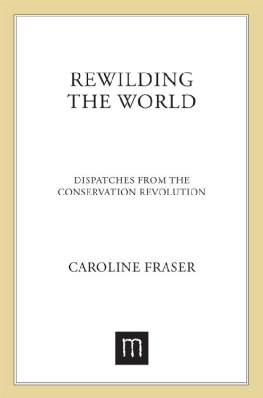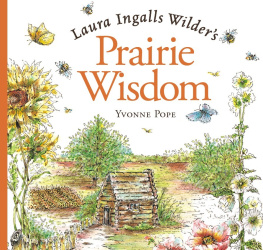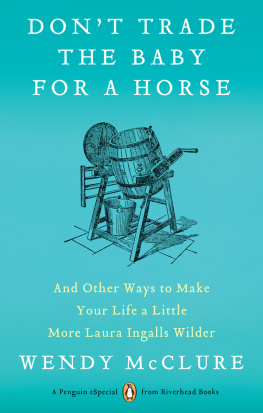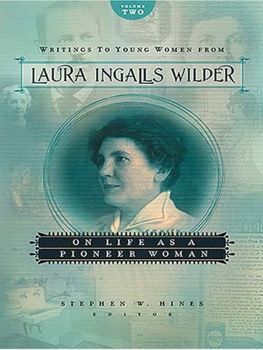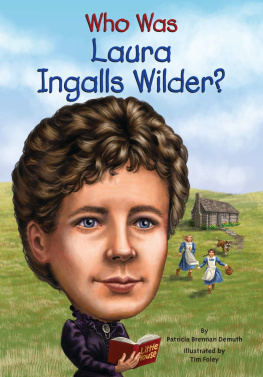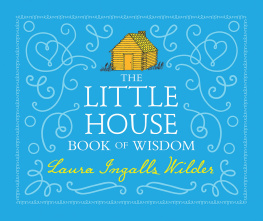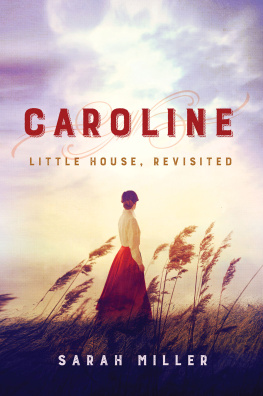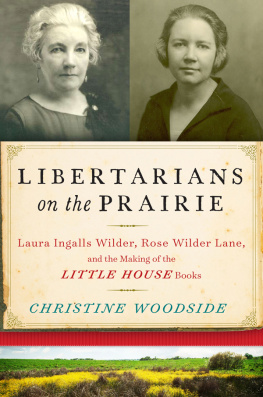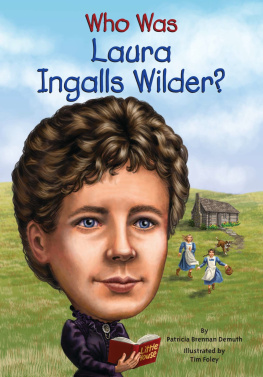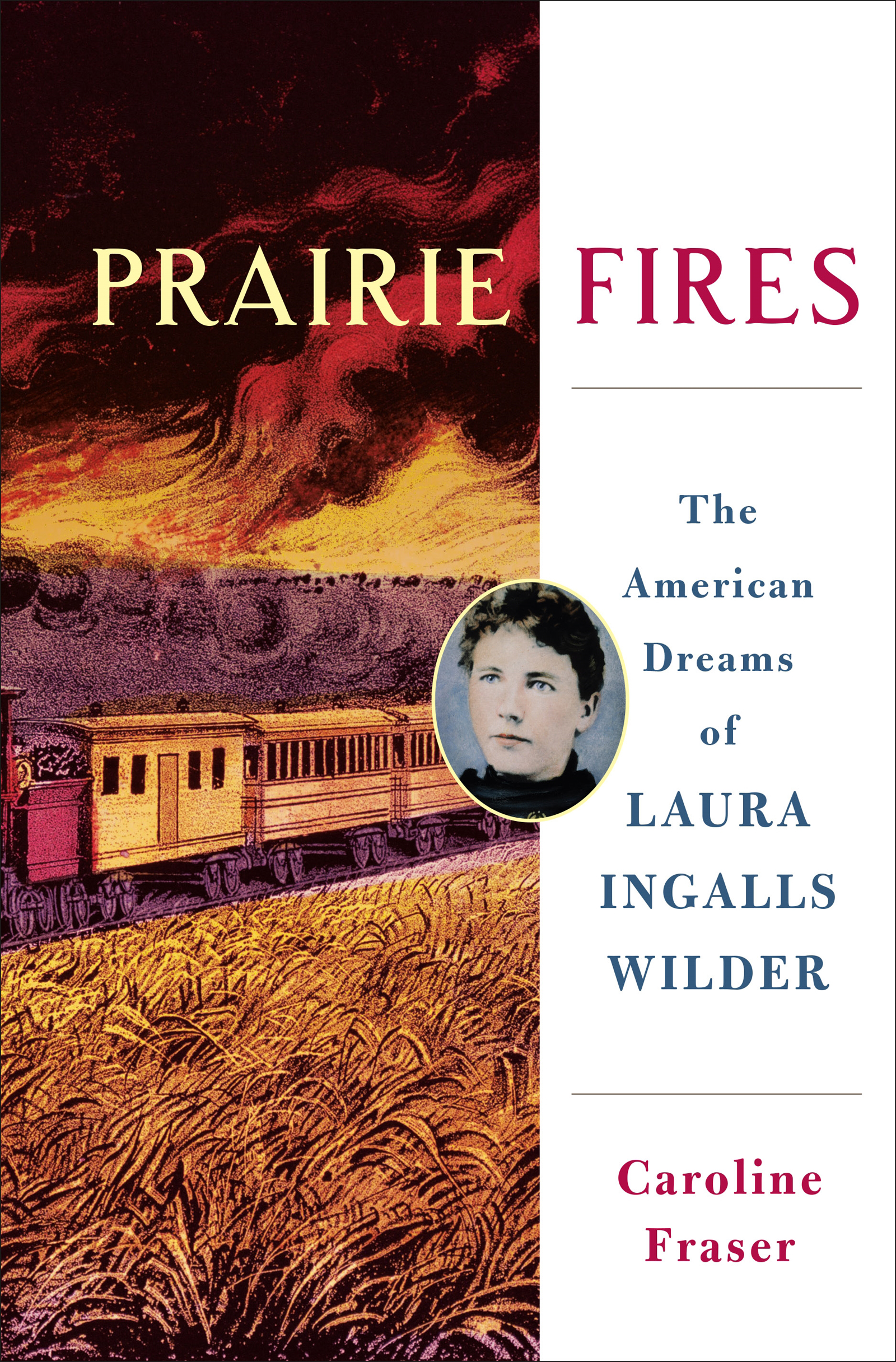Contents
Guide
Pagebreaks of the print version

The author and publisher have provided this e-book to you for your personal use only. You may not make this e-book publicly available in any way. Copyright infringement is against the law. If you believe the copy of this e-book you are reading infringes on the authors copyright, please notify the publisher at: us.macmillanusa.com/piracy.
In memory of my mother, Ruth Fraser, and my grandmother Ruth Webb
The prairies burning form some of the most beautiful scenes that are to be witnessed in this country.
George Catlin
Unless otherwise indicated, in quotations from the letters, diaries, and manuscripts of Laura Ingalls Wilder, Rose Wilder Lane, and others, all spelling, grammar, and punctuation are reproduced as they appear in the original source.

On a spring day in April of 1924, Laura Ingalls Wilder, a fifty-seven-year-old farm wife in the Missouri Ozarks, received a telegram from South Dakota. Her mother, Caroline Ingalls, had just died. Wilder hadnt seen her for more than twenty years.
A few weeks later, still reeling, she wrote a brief note to be published in place of her regular column in a farm newspaper. Every woman in the world who has lost her mother will recognize the retrospective shadow of sorrow, regret, and crippling nostalgia that the news cast across her life. Some of us have received such messages, she said flatly. Those who have not, one day will.
Then it all became too much to bear. Memories! she wrote. We go thru life collecting them whether we will or not! Sometimes I wonder if they are our treasures in heaven or the consuming fires of torment when we carry them with us as we, too, pass on.
It was a startling public outburst for a woman in a small Missouri town known to her neighbors as reserved, poised, even withdrawn. She seemed anguished by her memories, willed and unwilled. The realization that she would be visited for the rest of her life by images of people and places she could never forget was dismaying to her. They are with us forever, she wrote, as if in disbelief.
* * *
A S children, we thought we knew her. She was the real-life pioneer girl who survived wildfires, tornadoes, malaria, blizzards, and near-starvation on the Great Plains in the late 1800s. She was the fierce, uncompromising tomboy who grew up to write famous books about her life: Little House in the Big Woods , Farmer Boy , Little House on the Prairie , On the Banks of Plum Creek , By the Shores of Silver Lake , The Long Winter , Little Town on the Prairie , and These Happy Golden Years . She was the woman whose true-life stories went on to sell over sixty million copies in forty-five languages and were reincarnated in the 1970s and 1980s as one of the longest-running, most popular shows in television history, still in syndication.
But as adults, we have come to see that her autobiographical novels were not only fictionalized but brilliantly edited, in a profound act of American myth-making and self-transformation. As unpublished manuscripts, letters, and documents have come to light, we have begun to apprehend the scope of her life, a story that needs to be fully told, in its historical context, as she lived it. That tale is different from the one she wrote. It is an adult story of poverty, struggle, and reinventiona great American drama in three acts.
The third act was a long time in coming. At fifty-seven, Wilder was still far from becoming the emblematic figure of pioneer history. The woman whose life would become synonymous with the settlement of the West had spent most of her adult life living in the American South. She was not yet famous, had not yet written a book; the only writing she had published was her farm paper column. Anxious, she suffered from nerves and had a recurrent nightmare of walking down a long, dark road into obscure woods, the path of poverty.
She prided herself on superior hen-raising skills and keeping an immaculate house. She worried about whether giving women the vote might lead to moral laxity. A product of rural life, she also stood outside it, questioning the iron drudgery of turn-of-the-century domestic expectations. She advised women to give up the exhausting ritual of spring cleaning.
She had a sharp temper and a dry humor, noting the resemblance of a yard full of swine to their owners. Judgmental of others, she could be humble, even self-excoriating. She was parsimonious to a fault, but when she went into town she dressed elegantly in full skirts, lace collars, and hats garlanded with feathers or flowers. She favored long, dangling earrings, fastening her blouses with a cameo brooch. She loved velvet.
She was not an intellectual, but she had an intellect. She had never graduated from high school, but had studied with passion and vigor the Independent Fifth Reader. She knew a song for every occasion and passages of Shakespeare, Longfellow, Tennyson, Scott, Swinburne, and the Brownings. Books took pride of place in her living room, on custom-built shelves beside a prized stone hearth.
As her fifties drew to a close, she stood at a turning point. The first act of her life was long over. Her childhood had been packed with drama and incident: Indian encounters, prairie fires, blizzards, a virtual compendium of American frontier life. Growing up, she could count her possessions on her fingers. One tin cup. One slate, for school. One hair ribbon. A doll her mother made her. Clothes and shoes were hand-me-downs: a good dress for Sundays, another for all the other days. She married at eighteen and was a mother a year later.
By the age of twenty-one, she knew that everything she had ever had, no matter how hard-won, held the capacity to be lost. After a series of disasters, she and her husband left the Dakotas to rebuild seven hundred miles south, a long climb out of poverty constituting her lifes second act. She took in boarders and waited on tables. Her husband, crippled by a stroke in his twenties, recovered enough to drive a wagon, delivering fuel and freight. Their daughter, Rose, left home when still a teenager, eventually becoming a celebrity biographer in San Francisco. As soon as she saw the easy money to be made selling inspirational life stories of men as self-made as she wasHenry Ford, Jack London, Herbert Hoovershe began urging her mother to join her in the writing trade.
Wilder would become one of the self-made Americans her daughter so admired. In the third act of her life, in the midst of the Great Depression, she began recording, in soft pencil on tablets from the dime store, a memoir of her youth, the story of homesteaders who had unwittingly caused the Dust Bowl she was living through. Painfully casting her mind back to the previous century, she pressed on, kept awake all night by remembering her familys misfortunes and failed crops, her sister falling ill and going blind. What had been punishing to survive was heartbreaking to relive. Its H, she wrote to her daughter, taught never to swear.
Rose once jotted down a quotation she attributed to her mother: I dont know which is more heartbreaking, a dream un[ful]filled or a dream realized. She would help her mother realize a dream, bringing her professional connections and polish to the work, adding touches of cozy security to the hard reality. But it was her mothers stoic vision of pioneer grit that prevailed.


